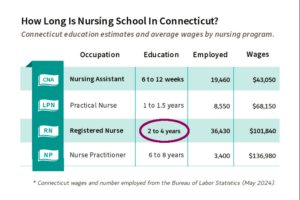Connecticut Nursing Schools and Programs
 When considering nursing programs in Connecticut, it’s essential to assess factors like acceptance and graduation rates, accreditation status, and available financial aid options.
When considering nursing programs in Connecticut, it’s essential to assess factors like acceptance and graduation rates, accreditation status, and available financial aid options.
Nursing is widely regarded as one of the most rewarding careers, offering daily challenges and diverse experiences.
Whether you’re starting your college journey or switching from another field, now is a great time to pursue nursing education in Connecticut.
Selecting the right nursing program can be overwhelming. This guide provides insights into the best nursing schools in Connecticut, along with salary prospects, job growth forecasts, and the most lucrative cities in the state. Continue reading to learn more about nursing careers in Connecticut, or go directly to our list of top nursing programs.

Struggling to meet your deadline?
Get your assignment on The best Connecticut Nursing Schools and Programs done by certified MDs and PhDs in the USA. ORDER NOW!
Here, we highlight the leading nursing programs in Connecticut, helping prospective students evaluate options based on their preferences.
Ranking Methodology
Our approach to ranking the best nursing schools in Connecticut uses a data-driven method. We look at factors such as academic quality, affordability, reputation, and program offerings. We utilize data from the Integrated Postsecondary Education Data System (IPEDS) to ensure that our information is current. However, specific program details may vary.
The best Connecticut Nursing Schools and Programs
| # | University Name | Location | Duration | Programs Offered | Tuition |
|---|---|---|---|---|---|
| 1 | Yale University | New Haven, CT | 4 years | GEPN, MSN, DNP (leadership and clinical), post-master’s certificates | $23,557/semester (GEPN, MSN); $15,637 (DNP – leadership); $20,000 (DNP – clinical) |
| 2 | University of Connecticut | Storrs, CT | 4 years | BSN, MSN, DNP, Ph.D. in Nursing, graduate nursing certificates | $15,030 (in-state); $37,698 (out-of-state); $925/credit (graduate) |
| 3 | Quinnipiac University | Hamden, CT | 4 years | BSN, MSN, online MSN in Operational Leadership, RN-to-MSN, DNP in Nurse Anesthesia | $49,170 (undergraduate); $1,085/credit (MSN); $750/credit (online MSN) |
| 4 | Fairfield University | Fairfield, CT | 4 years | Traditional BSN, accelerated second-degree BSN | $53,630/year; $765/credit (RN-to-BSN) |
| 5 | Sacred Heart University | Fairfield, CT | 4 years | BSN, second-degree BSN, online RN-to-BSN, online MSN, DNP | $22,480/semester (undergraduate); $995/credit (DNP) |
| 6 | Central Connecticut State University | New Britain, CT | 4 years | BSN, RN-to-BSN, MSN | $5,731/term (in-state); $12,433/term (out-of-state) |
| 7 | University of Hartford | West Hartford, CT | 4 years | BSN, RN-to-BSN, MSN | $48,150/year (undergraduate); $1,350/credit (graduate) |
| 8 | Southern Connecticut State University | New Haven, CT | 4 years | BSN, RN-to-BSN, MSN | $11,236/year (in-state); $24,758/year (out-of-state) |
| 9 | Western Connecticut State University | Danbury, CT | 4 years | BSN, RN-to-BSN | $11,166/year (in-state); $26,046/year (out-of-state) |
| 10 | Goodwin University | East Hartford, CT | 4 years | BSN, RN-to-BSN | $13,650/year (undergraduate) |
Connecticut Nursing Schools and Programs
#1 Yale University
Location: New Haven, CT
Duration: 4 years
Campus: On-site
Yale University is a prestigious institution known for its top-tier nursing programs. The School of Nursing offers various graduate options, including the Graduate Entry Prespecialty in Nursing (GEPN), Master of Science in Nursing (MSN), and Doctor of Nursing Practice (DNP) with multiple specializations. Students benefit from advanced simulation labs that facilitate hands-on learning and clinical practice. Yale’s commitment to research and public health informs its curriculum, preparing students to become leaders in nursing and health policy.
Yale emphasizes a rigorous academic environment, collaboration among students and faculty, and a diverse approach to healthcare challenges. Admission requirements vary by program, but all nursing candidates must hold a bachelor’s degree. With a competitive admission rate of about 6%, Yale attracts top talent in the field.
- Programs Offered: GEPN, MSN, DNP (leadership and clinical), post-master’s certificates (various specialties)
- Tuition: $23,557 per semester for GEPN and MSN; $15,637 for DNP – leadership; $20,000 for DNP – clinical
- Website: Yale University School of Nursing
#2 University of Connecticut
Location: Storrs, CT
Duration: 4 years
Campus: Online + On-site
The University of Connecticut (UConn) holds a significant position in nursing education as the first public university in the state to offer a Bachelor of Science in Nursing (BSN). UConn’s School of Nursing provides a range of degrees, from BSN to doctoral levels, alongside continuing education for registered nurses. The program integrates research and practice, equipping students with the skills necessary to excel in various nursing roles.
UConn emphasizes community health and patient care, fostering partnerships with local healthcare facilities for clinical training. The admission process varies by program, but a bachelor’s degree is a prerequisite for all nursing candidates.
- Programs Offered: BSN, MSN, DNP, Ph.D. in Nursing, graduate nursing certificates
- Tuition: $15,030 (in-state undergraduate); $37,698 (out-of-state undergraduate); $925 per credit for graduate programs
- Website: University of Connecticut School of Nursing
#3 Quinnipiac University
Location: Hamden, CT
Duration: 4 years
Campus: Online + On-site
Quinnipiac University is renowned for its comprehensive nursing programs, designed to prepare students for leadership roles in healthcare. The School of Nursing offers various degrees, including BSN, MSN, and specialized programs like RN-to-MSN and DNP in Nurse Anesthesia. With partnerships at over 300 clinical sites, Quinnipiac provides extensive hands-on training.
The nursing curriculum promotes critical thinking, collaboration, and evidence-based practice, ensuring graduates are well-prepared for the demands of modern healthcare. The university’s high NCLEX-RN pass rate reflects its commitment to student success.
- Programs Offered: BSN, MSN, online MSN in Operational Leadership, RN-to-MSN, DNP in Nurse Anesthesia
- Tuition: $49,170 (undergraduate); $1,085 per credit (MSN); $750 per credit (online MSN)
- Website: Quinnipiac University School of Nursing

#4 Fairfield University
Location: Fairfield, CT
Duration: 4 years
Campus: Online + On-site
Fairfield University’s Marion Peckham Egan School of Nursing & Health Studies emphasizes ethical nursing practice and community engagement. Offering traditional BSN and accelerated second-degree BSN programs, Fairfield provides a solid foundation in nursing with a focus on serving underserved populations.
Students engage in various extracurricular activities, such as the Student Nurses Association, which enhances their educational experience. The strong NCLEX-RN pass rate indicates the program’s effectiveness in preparing students for their careers.
- Programs Offered: Traditional BSN, accelerated second-degree BSN
- Tuition: $53,630 per year; $765 per credit for RN-to-BSN
- Website: Fairfield University School of Nursing
#5 Sacred Heart University
Location: Fairfield, CT
Duration: 4 years
Campus: Online + On-site
Sacred Heart University’s College of Nursing is known for its diverse array of programs, including 13 undergraduate and graduate nursing degrees. The college emphasizes hands-on learning through state-of-the-art simulation labs, enabling students to practice essential nursing skills in realistic settings.
Sacred Heart’s flexible program options cater to traditional students and working professionals alike. The high NCLEX-RN pass rate and strong job placement statistics underscore the college’s commitment to student success and professional readiness.
- Programs Offered: BSN, second-degree BSN, online RN-to-BSN, online MSN, DNP
- Tuition: $22,480 per semester (undergraduate); $995 per credit (DNP)
- Website: Sacred Heart University College of Nursing
#6 Central Connecticut State University
Location: New Britain, CT
Duration: 4 years
Campus: Online + On-site
Central Connecticut State University (CCSU) offers a comprehensive nursing education that includes BSN, RN-to-BSN, and MSN programs. The nursing curriculum emphasizes patient-centered care and cultural competency, preparing graduates to serve diverse communities effectively.
CCSU provides experiential learning opportunities and nursing-specific scholarships to support students financially. The perfect NCLEX-RN pass rate showcases the program’s effectiveness and the preparedness of its graduates for professional practice.
- Programs Offered: BSN, RN-to-BSN, MSN
- Tuition: $5,731 per term (in-state undergraduate); $12,433 per term (out-of-state undergraduate)
- Website: Central Connecticut State University School of Nursing
#7 University of Hartford
Location: West Hartford, CT
Duration: 4 years
Campus: On-site
The University of Hartford offers a variety of nursing programs through its College of Education, Nursing and Health Professions. Known for its supportive learning environment, the university provides BSN and RN-to-BSN programs, along with a Master of Science in Nursing (MSN) for those looking to advance their careers.
The curriculum integrates classroom instruction with hands-on clinical experiences, ensuring that students are well-prepared for the challenges of nursing practice. The faculty emphasizes mentorship, guiding students through their educational journey.
- Programs Offered: BSN, RN-to-BSN, MSN
- Tuition: $48,150 per year (undergraduate); $1,350 per credit (graduate)
- Website: University of Hartford College of Education, Nursing and Health Professions
#8 Southern Connecticut State University
Location: New Haven, CT
Duration: 4 years
Campus: Online + On-site
Southern Connecticut State University (SCSU) provides a well-rounded nursing education through its undergraduate and graduate programs. The BSN program is designed to prepare students for the NCLEX-RN exam and to enter the workforce as competent nursing professionals. SCSU also offers an RN-to-BSN program that caters to working nurses seeking to advance their education.
The faculty focuses on promoting critical thinking and clinical decision-making skills, while students benefit from hands-on experiences in various healthcare settings.
- Programs Offered: BSN, RN-to-BSN, MSN
- Tuition: $11,236 per year (in-state undergraduate); $24,758 (out-of-state undergraduate)
- Website: Southern Connecticut State University School of Nursing
#9 Western Connecticut State University
Location: Danbury, CT
Duration: 4 years
Campus: Online + On-site
Western Connecticut State University (WCSU) offers a strong nursing program that includes a BSN and an RN-to-BSN track. WCSU focuses on community health and patient advocacy, ensuring that graduates are prepared to address health disparities in diverse populations.
The university emphasizes hands-on clinical experience and offers various learning opportunities through partnerships with local healthcare providers. The supportive faculty play a crucial role in mentoring students throughout their academic careers.
- Programs Offered: BSN, RN-to-BSN
- Tuition: $11,166 per year (in-state undergraduate); $26,046 (out-of-state undergraduate)
- Website: Western Connecticut State University Nursing
#10 Goodwin University
Location: East Hartford, CT
Duration: 4 years
Campus: Online + On-site
Goodwin University offers an innovative nursing program that prepares students for the ever-evolving healthcare landscape. The BSN program focuses on experiential learning and incorporates simulation-based training to enhance clinical skills.
Goodwin’s nursing curriculum is designed to be flexible, accommodating the needs of both traditional and adult learners. The university’s partnerships with local healthcare organizations provide students with valuable clinical experience, preparing them for successful careers in nursing.
- Programs Offered: BSN, RN-to-BSN
- Tuition: $13,650 per year (undergraduate)
- Website: Goodwin University Nursing

How to Choose a Nursing Program in Connecticut
When selecting a nursing school in Connecticut, several factors should be taken into account. Initial considerations may include tuition costs, as they can significantly impact post-graduation years when repaying loans.
Balancing overall costs against available financial aid, such as work-study programs, is crucial to lowering student debt. Connecticut offers a student financial aid portal, which provides information on state-specific financial opportunities, including the CHESLA loan program and the Roberta B. Willis Scholarship programs.
Other factors to consider are the acceptance rate, the availability of online classes, and the school’s accreditation status. Accreditation is vital for taking the National Council Licensure Examination for Registered Nurses (NCLEX-RN), a mandatory step to obtain a state license. The school’s NCLEX pass rate is also indicative of how well the program prepares students for success.
Why Become a Nurse in Connecticut
The U.S. Bureau of Labor Statistics (BLS) projects a 9% growth in nursing employment from 2020 to 2030, a trend mirrored in most states, including Connecticut. In response to the nursing shortage, Connecticut initiated comprehensive measures in 2007, such as faculty increase programs, nursing loan repayment initiatives, higher education institution funding, and robust recruitment and retention campaigns.
Why Pursue a Career in Nursing in Connecticut
The Connecticut Center for Nursing Workforce actively supports sustainable and diverse healthcare, providing valuable reports and statistics on nursing education, including statewide graduate rates and student demographics. Notably, Connecticut doesn’t enforce right-to-work laws, allowing employees to decide on union participation. This flexibility enhances employment options for nurses.
Beyond its healthcare initiatives, Connecticut boasts excellent education systems, a scenic coastline, delectable seafood, and a rich history, making it an appealing destination for both living and tourism.
Nursing Salary and Job Outlook in Connecticut
Connecticut’s cost-of-living index is 119.5, surpassing the U.S. average of 100. The BLS reports a 2020 median annual salary of $75,330 for registered nurses (RNs), with Connecticut’s average at $84,850, ranking 12th nationally.
Nurse practitioners (NPs) in the U.S. earn a median salary of $111,680, while Connecticut NPs average $116,780 annually. High-demand settings for advanced practice registered nurses (APRNs) include physicians’ offices, hospitals, outpatient care centers, and educational institutions. Connecticut’s Department of Labor anticipates significant job growth, projecting 2,850 new nursing job openings from 2018 to 2028.
Connecticut’s above-average annual nursing salaries help offset its higher cost of living. The table below showcases salary figures for RNs in Connecticut’s top five metropolitan areas:
| Top Paying Metropolitan Areas | Average Salary for RNs |
|---|---|
| Danbury | $91,230 |
| Bridgeport — Stamford — Norwalk | $88,870 |
| New Haven | $86,490 |
| Norwich — New London — Westerly | $86,330 |
| Hartford — West Hartford — East Hartford | $83,010 |
Source: BLS
Steps to Enter the Nursing Profession in Connecticut
In Connecticut, nursing licensure falls under the oversight of the Connecticut Board of Examiners within the Department of Public Health. Prospective nurses must complete an accredited nursing program meeting state guidelines for practice.
Requirements for RNs
Becoming an RN in Connecticut aligns with national standards. Graduates from programs accredited by the Commission on Collegiate Nursing Education or the Accreditation Commission for Education in Nursing are eligible. After completing a bachelor of science in nursing (BSN) or an associate degree in nursing (ADN), candidates must pass the NCLEX-RN examination. Subsequently, they apply online through the Department of Public Health for their state nursing license.
The Connecticut Board of Examiners issues the state license, contingent on meeting requirements like a $180 application fee, nursing program transcripts, validation of the nursing degree, and a passing NCLEX-RN score. New nurses acquire their state license through examination. However, those moving to Connecticut with a valid out-of-state license can apply for a license endorsement.
License renewal is conveniently done online, starting 60 days before expiration. Nurses submit a $110 application fee and fulfill continuing education requirements, including two hours on screening for psychological conditions and two hours on suicide prevention.
Requirements for APRNs
Nurses seeking advanced education must complete a master of science in nursing or a doctor of nursing practice program meeting Connecticut guidelines. The program must be accredited, and candidates must hold an active RN license while maintaining certification from a board-approved national certifying organization.
APRNs must secure professional liability insurance and obtain a Connecticut Controlled Substance Registration for prescribing controlled substances. Before practicing independently, APRNs must collaborate with a licensed physician for 2,000 hours.
Out-of-state APRNs must apply for an RN license endorsement and fulfill APRN licensing requirements. Initial application fees amount to $200, with a $130 renewal fee.
Frequently Asked Questions About Nursing in Connecticut
Is there a nursing shortage in Connecticut?
Yes, similar to the U.S., Connecticut faces a nursing shortage, with the Department of Labor projecting 2,850 job openings by 2030. Contributing factors include an aging workforce and post-pandemic shifts in nurses’ employment preferences.
How do I get a Connecticut nursing license?
Nurses apply for their license through the Connecticut Board of Examiners, part of the Department of Public Health. Initial license applications or renewals are facilitated online, requiring necessary documentation and an application fee.
How long does it take to get a Connecticut nursing license?
For new nurses, the board of examiners may take up to four weeks to issue a license after receiving all required documentation. Nurses with an active out-of-state license can obtain a temporary permit within 15 business days, valid for 120 days and non-renewable.
How long is a Connecticut RN license good for?
Connecticut RN licenses are valid for one year, expiring in the licensee’s birthday month. Renewals can be initiated 60 days before expiration, involving an application fee, continuing education fulfillment, and meeting specific topic requirements.

Dont wait until the last minute.
Provide your requirements and let our native nursing writers deliver your assignments ASAP.

